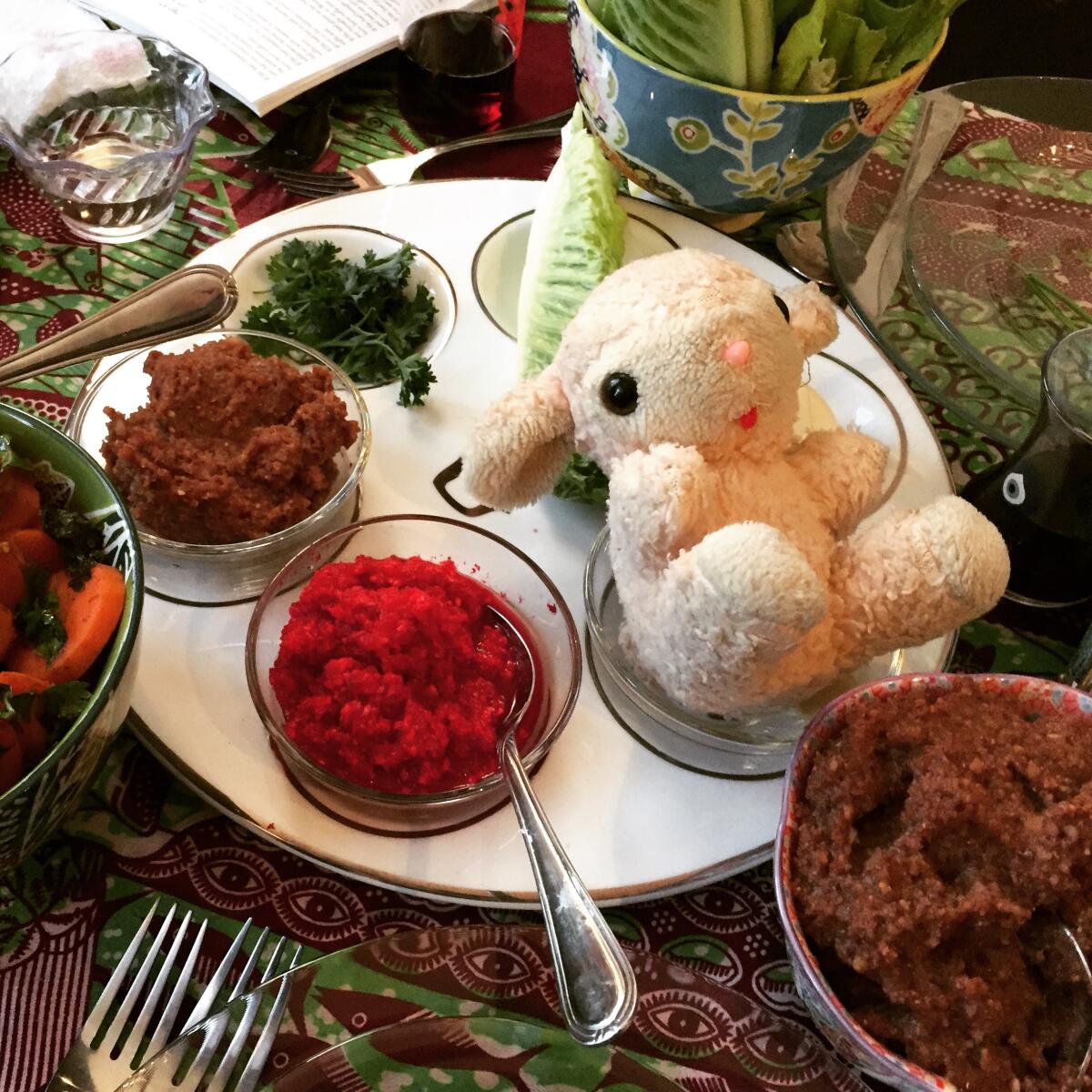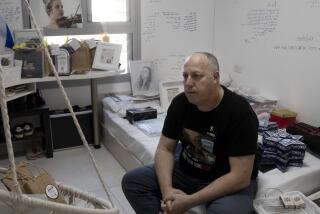How is this night different from all other nights? Coronavirus disrupts Passover traditions

Last week, my in-laws called and asked us not to come for Passover.
It was inevitable. Both are elderly and have barely left home since the first coronavirus cases appeared in L.A. If they hadn’t decided it for us, we would have done it for them. Still, there were tears. Ram, my 4-year-old son, was devastated. Tal, my 38-year-old husband, was bereft.
For millions of Jews like us, Passover is the highlight of the religious year. Exodus is central to Jewish identity, the defining moment of our people. It’s a thriller story with a high-concept title, the climax of the declaration of faith we’re commanded to make every day: I am the Lord your God who brought you out of the land of Egypt to be your God; I, the Lord, am your God.
It is also deeply personal, practiced with equal enthusiasm among the observant and the secular: Unlike the autumn High Holidays, whose rites revolve around the synagogue and the Torah, Passover’s central mitzvah is performed at home, with family, singing and sharing stories around the holiday table. My best friend in New York had planned to fly here to host Seder with us. Many others circle the globe to be together.
The pandemic has made such journeys impossible, splitting Jews for Passover as surely as it will Christians for Easter this Sunday and Muslims over Ramadan, which begins later this month. But Zooming a Seder is more fraught than live-streaming Mass or hosting a virtual Iftar. Traditionally, electronics are forbidden on the first two days of the holiday, when the Seders are held. This year, those days run directly into Shabbat, when even tighter restrictions are observed. My Instagram stories are filled with Orthodox friends preparing to spend three huge, festive meals entirely alone.
Many others are quietly setting up virtual tables behind closed doors.
So how is this Seder different from all other Seders?
That depends whom you ask.
Take Pico-Robertson, the largely Orthodox enclave where I live. At Elat, the kosher grocery store where we shop, many foods are marked Star-S P, meaning they have been specially certified kosher for Passover for Jews from Africa and the Middle East. At Glatt Mart, just steps away, Jews from Eastern Europe avoid such foods the same way they avoid clams and bacon.
That’s the funny thing about Passover — most of us grew up following its strict dietary rules even if we didn’t keep kosher the rest of the year. It was one of the most disconcerting things about getting married: my husband’s Persian-Israeli family ate foods like corn and legumes that I’d carefully avoided on Passover for the previous quarter-century. My mother-in-law scolded me sharply when I tried to get rid of our rice.
“It’s by the husband’s custom,” she said.
As went rice, so now goes Zoom.
Several prominent Orthodox rabbis representing communities from the Middle East and Africa have ruled that the pandemic’s extraordinary circumstances allow for extraordinary loopholes. They say virtual Seders are kosher so long as the connections are set up before the holiday begins on Wednesday evening. (Non-Orthodox rabbis uniformly agree that such electronic gatherings are allowed, regardless of when or how they are arranged.)
But virtually all Orthodox authorities from the Eastern European tradition disagree. My beloved Brooklyn rabbi, who belongs to a Hasidic sect from Russia, sent us a moving lecture over WhatsApp arguing for the solitary Seder. We’re commanded to recall the affliction of bondage as though we ourselves had lived it, body and soul. What greater suffering than to celebrate freedom alone?
“It’s by the husband’s custom,” my mother-in-law demurred.
So we’re making our Seders on Zoom this year. It’s been ... hard. For one thing, the weeks of deep cleaning we normally do ahead of the holiday were all displaced by the “new normal” of the pandemic. There’s been a shortage of holiday foods like shmura matzo — the artisanal, handmade stuff baked in basement factories in Brooklyn and Israel — and the Instagram trend of regrowing green onions means there’s few left to hit each other with during the singing of “Dayenu.”
The Passover Seder meal during coronavirus can include traditional and modern recipes that use pantry ingredients as well as fresh fruit and vegetables.
Even the Seder has had to be reordered a bit for virtual reality. Where normally we would pass out prayer books to our guests, we’ve instead sent PDFs of the PJ Library Family Haggadah, which is extremely accessible to every level of observance and available to download for free.
The response has been overwhelming, and for once, my husband can’t say our apartment is too small for such a crowd. Among our guests will be nurses and doctors and teachers and reporters — essential workers who face the destructive power of this virus every day. Like us, they’re seeking hope where little is apparent, praying for a miracle to end what has felt at times like an 11th plague. (The holiday recounts 10 plagues visited on the Egyptians.)
In many ways, adapting our observance under quarantine has allowed us to connect more deeply with the holiday — not only its suffering, but its spirit of hope in the face of despair. Our tradition teaches that the Red Sea did not split when the Israelites first reached it. Most thought they would die there — they cried out to Moses, Was it for want of graves in Egypt that you brought us to die in the desert?
But one man, Nahshon, walked into the waves up to his nose, believing deliverance would follow.
Such ingenuity in extraordinary circumstances feels especially urgent now.
It was that ingenuity that gave our ancestors matzo: if we had waited for our bread to rise before fleeing enslavement, we would not have followed Nahshon into the Red Sea, would not have walked across dry land to freedom. Receiving the miracle of redemption meant making do with what was to hand.
As with matzo, so now with Zoom.
More to Read
Start your day right
Sign up for Essential California for news, features and recommendations from the L.A. Times and beyond in your inbox six days a week.
You may occasionally receive promotional content from the Los Angeles Times.







